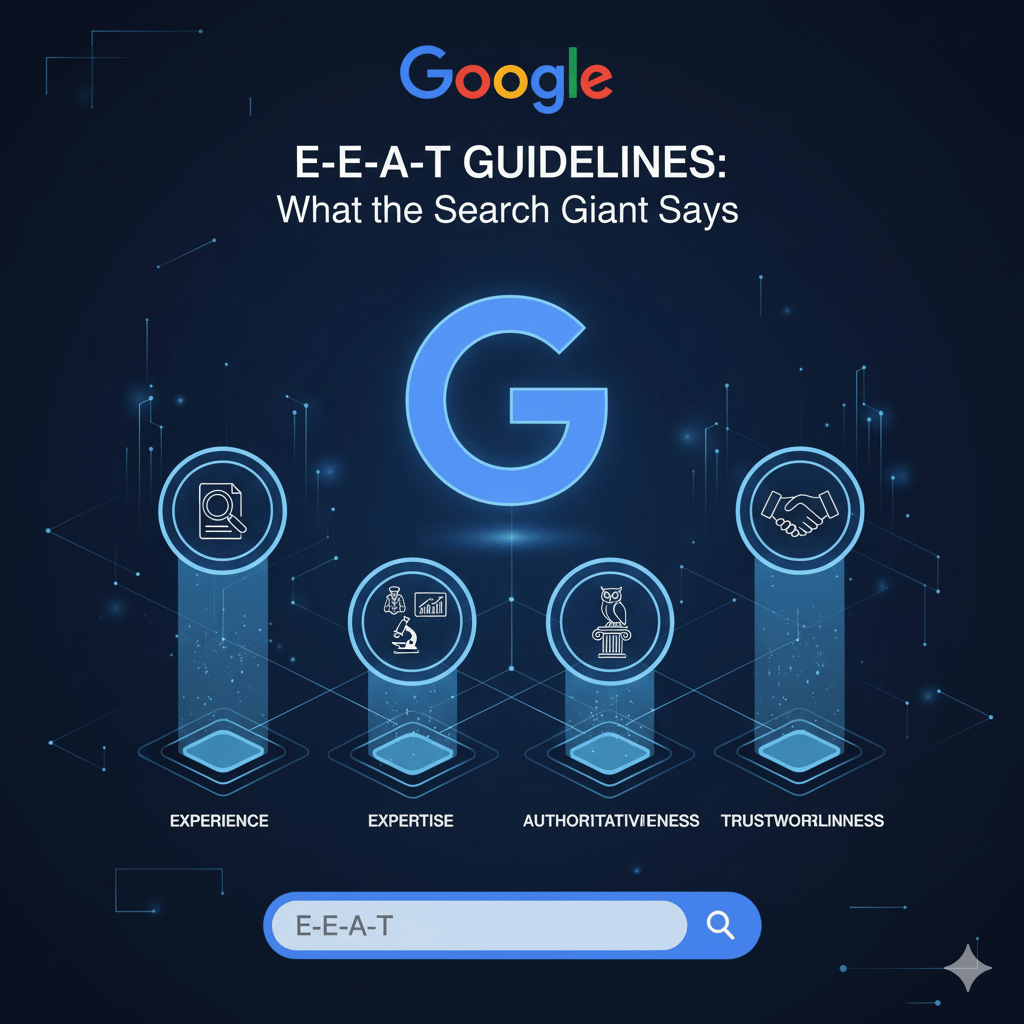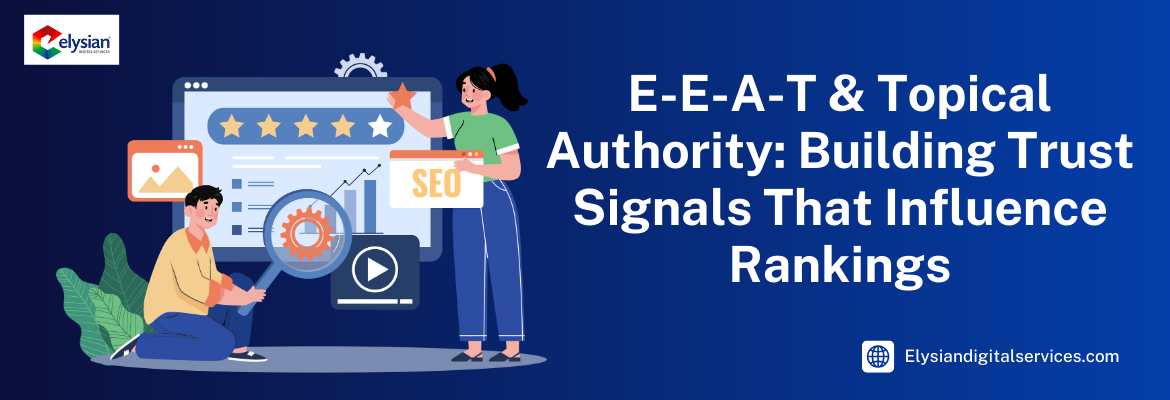Table of Contents
ToggleE-E-A-T & Topical Authority: Building Trust Signals That Influence Rankings
Unlock the secrets of Google’s E-E-A-T framework and Topical Authority. This guide will show you how to build a powerful web presence that signals trust and expertise to Google, boosting your rankings and connecting with your audience on a deeper level.

Why E-E-A-T & Topical Authority Are a Game-Changer
Look, let’s be real for a minute. The world of SEO is a wild, ever-changing beast. You think you’ve got it all figured out, and then Google goes and drops a major update, turning everything on its head. For the longest time, it felt like the game was all about keywords and backlinks. But these days, it’s a whole different ballgame. If you’re still playing by the old rules, you’re just spinning your wheels.
This is where E-E-A-T comes into play. You see, Google has gotten way smarter. It’s not just looking at the words on a page anymore; it’s trying to figure out if you’re the real deal. It wants to know if you’re a trustworthy source of information. The old E-A-T framework (Expertise, Authoritativeness, and Trustworthiness) was a big step, but with the addition of that first “E” for Experience, it’s become even more focused on genuine, first-hand knowledge. That’s a huge deal.
Now, a related concept that’s just as vital is Topical Authority. Think of it this way: if E-E-A-T is about who you are, Topical Authority is about what you know. It’s about becoming the go-to resource for a specific subject. When Google sees that you’ve written a comprehensive, interconnected set of content on a topic, it starts to see you as an expert. And when Google sees you as an expert, it’s way more likely to send users your way.
If you’re wondering how to get your content to stand out from the noise, this is the answer. You really need to read this content because you’ll want the best answer to your query, and we’re going to break it all down for you.
The E-E-A-T Full Form and Its Core Components
So, what’s the big deal about E-E-A-T? Let’s unpack the acronym. As mentioned, it stands for:
- Experience: This is the new kid on the block, added in late 2022. It’s all about first-hand, personal knowledge. Did you actually use the product you’re reviewing? Did you really visit the places you’re writing about? Showing a user that you’ve got hands-on experience builds a massive amount of trust. It’s the difference between a textbook explanation and a genuine story.
- Expertise: This is about having a high level of skill or knowledge in a particular field. This doesn’t just apply to doctors and lawyers. A great baker can have expertise in baking, and a seasoned gamer can have expertise in gaming. It’s about demonstrating your deep knowledge, whatever the topic.
- Authoritativeness: This is about your reputation. Are you seen as a respected source of information by others in your field? This is where mentions, links, and citations from other reputable sources come in. It’s a bit like having people vouch for you.
- Trustworthiness: This is the bedrock of it all. It’s the “T” that underpins the other three. Can users trust that your site is safe, honest, and reliable? This includes things like having a secure website (HTTPS), accurate contact information, and transparent policies.

Google's E-E-A-T Guidelines: What the Search Giant Says
You can’t really talk about this stuff without getting into the nitty-gritty of Google E-E-A-T guidelines. These aren’t a secret; they’re laid out in Google’s Search Quality Rater Guidelines, a document used by human quality raters to evaluate search results. While E-E-A-T isn’t a direct ranking factor in the way we think of keywords, it’s the framework those human raters use to assess page quality. And those assessments absolutely influence the algorithms.
Essentially, Google is telling its raters to ask themselves a bunch of questions:
- Is the content’s creator an expert on the subject?
- Does the content offer real, first-hand experience?
- Is the website a reputable source in its industry?
- Can users trust the information presented?
If the answer to these questions is a resounding “yes,” that page is likely to be seen as high-quality, and that’s a surefire way to get a leg up in the SERPs. The raters are literally trained to spot this stuff, so you’d be a fool not to take it seriously.
The Topical Authority Connection: From Generalist to Go-To
Building topical authority is the natural next step after embracing E-E-A-T. Instead of creating a random mix of content, you’re strategically building a “content cluster” around a central topic. Think of it like a wheel, with your main topic page at the hub and spokes leading to individual articles that delve deeper into sub-topics.
How does this work?
- Pick a niche: Instead of trying to be an expert on everything, become the definitive source on one thing.
- Create a pillar page: This is a comprehensive, long-form guide on your main topic. It’s your hub.
- Build content spokes: Write individual articles that cover specific, related sub-topics. For example, if your pillar page is on “Digital Marketing,” a spoke could be “How to Master SEO Keyword Research.”
- Interlink, interlink, interlink! This is crucial. [internal linking example] The pillar page should link to all the spoke articles, and the spoke articles should link back to the pillar page and to each other where relevant. This creates a strong web of interconnected content, signaling to Google that you have a comprehensive understanding of the topic. This is a great place to highlight your expertise.
This strategy not only helps with SEO, but it also gives your users a fantastic experience. They can dive deep into a topic without having to jump all over the web.
Your E-E-A-T Checklist: Actionable Steps to Build Trust
So, you’re ready to roll up your sleeves? Here’s a practical E-E-A-T checklist to get you started.
- Showcase Your Team: Create a detailed “About Us” page that introduces your team. Include professional headshots, bios, and links to their social media profiles or personal websites. This humanizes your brand.
- Add Author Bios: For every blog post, include an author bio with their name, a brief description of their qualifications, and a link to their dedicated author page. This is a key part of demonstrating your expertise.
- Get a Reputable Digital Footprint: Think beyond your website. Get mentioned in industry publications, on podcasts, and in forums. Positive online reviews and testimonials on third-party sites are pure gold.
- Keep it Honest and Up-to-Date: Regularly review and update your content. For example, if an article from 2023 references an old statistic, update it with a new one. This shows you’re committed to accuracy.
- Embrace Transparency: Have clear contact information, a privacy policy, and terms of service. For YMYL (Your Money or Your Life) topics, this is non-negotiable.
- Use First-Hand Content: Use original images, videos, and data. Don’t just rehash what others have said; prove you’ve done the work yourself. Case studies are an excellent way to do this.
Optimize Your Site’s Foundation: A secure, mobile-friendly, and fast-loading site is a must. These technical trust signals lay the groundwork for everything else.
E-E-A-T Examples in Action
Let’s get a little more specific with some E-E-A-T examples.
- For a Food Blogger: Instead of just a recipe, the blogger includes a personal anecdote about how they developed it, photos of themselves cooking it in their own kitchen (not stock photos!), and a video of them tasting the final dish. The author’s bio mentions their culinary school training and their years of experience as a home cook. That’s a strong show of experience and expertise.
- For a Financial Advisor’s Website: Every article is bylined with the author’s name, and their author bio lists their CFP® certification and years of experience. The site has a clear disclaimer, a physical office address listed, and numerous testimonials from clients. That’s a textbook example of authoritativeness and trustworthiness.
- For a DIY Blog: A post on building a shelf includes a step-by-step tutorial with pictures taken by the author, a video of them using the tools, and a section on the mistakes they made and how to avoid them. This first-hand experience is what users crave.
Beyond the Algorithm: The Human Connection
While we talk a lot about Google and its algorithms, let’s not lose sight of the bigger picture. E-E-A-T and Topical Authority aren’t just for pleasing a robot; they’re about building a genuine connection with your audience. When users land on your site and immediately feel like you know what you’re talking about, they’re more likely to stick around. They’ll read more, they’ll trust your recommendations, and they’ll come back for more.
The Role of Elysian Digital Services in Your E-E-A-T Strategy
Okay, so this all sounds like a lot of work, right? It can be. Building a robust online presence that meets the high standards of Google’s algorithms takes time and a certain know-how. This is where a strategic partner can make all the difference.
For instance, at Elysian Digital Services, we help clients with E-E-A-T SEO by focusing on a holistic approach. It’s not just about writing content; it’s about strategic content creation, keyword mapping, and building those critical trust signals. We work with clients to identify their unique expertise, create content that showcases their experience, and develop a comprehensive strategy to build their reputation online. We can help you with your keyword mapping strategy to ensure every piece of content is perfectly targeted and interconnected. [internal linking example] The idea is to build a brand that isn’t just visible, but is genuinely seen as the authority in its space.
FAQs
Q1:What exactly is E-E-A-T?
E-E-A-T is an acronym used by Google in its Search Quality Rater Guidelines. It stands for Experience, Expertise, Authoritativeness, and Trustworthiness. It’s a framework that Google’s human raters use to evaluate the quality of a webpage, with a strong emphasis on content that is credible, reliable, and created by a knowledgeable source.
Q2: Is E-E-A-T a direct Google ranking factor?
No, E-E-A-T is not a direct, technical ranking factor like page speed or keywords. Instead, it is a set of principles that Google’s algorithms are designed to detect. The goal is for the algorithms to identify and reward content that demonstrates a high level of E-E-A-T, which in turn influences rankings. Think of it as a guiding philosophy for Google’s algorithms, not a single checkbox.
Q3:What is the difference between E-A-T and E-E-A-T?
The “E” for “Experience” was added to the original E-A-T framework in late 2022. While E-A-T focused on a creator’s formal expertise, authority, and trustworthiness, E-E-A-T places a new emphasis on first-hand, personal experience. This means content that shows the creator has actually used a product, visited a location, or has genuine, hands-on knowledge of a topic is now highly valued.
Q4:How does Topical Authority relate to E-E-A-T?
Topical Authority is the practical strategy for demonstrating E-E-A-T. While E-E-A-T is about who you are (an experienced, expert, authoritative, and trustworthy source), Topical Authority is about what you know. You build Topical Authority by creating a comprehensive, interconnected body of content (a “content cluster”) around a specific topic, which signals to Google that you are a definitive, go-to resource in that niche.
Q5: What is a “content cluster” and how do I create one?
A content cluster is a group of interlinked articles built around a single, broad topic. To create one, you start with a “pillar page” a comprehensive, long-form guide on the main topic. Then, you create individual “spoke” articles that delve deeper into specific sub-topics. Crucially, you must interlink all of these pages, with spokes linking back to the pillar and to each other, to create a strong web of connected content.
Conclusion
In the ever-evolving landscape of search engine optimization, the shift towards E-E-A-T and Topical Authority is not just another fleeting trend; it’s a fundamental change in how Google evaluates and ranks content. The era of low-quality, keyword-stuffed content is over. Today, success hinges on building genuine trust and credibility. By focusing on demonstrating real-world Experience, deep Expertise, and a reputation for Authoritativeness and Trustworthiness, you’re not just playing a smarter SEO game you’re building a brand that resonates with both algorithms and, more importantly, with people.
This approach forces you to create a better product for your users, and that’s precisely what Google wants. As the digital world becomes more crowded, trust is the most valuable asset you can possess. By mastering the principles of E-E-A-T and strategically building Topical Authority, you will position your website as the go-to source in your niche, securing a competitive advantage that goes far beyond any single ranking factor. It’s an investment in your long-term digital success, built on the solid foundation of authenticity and value.
